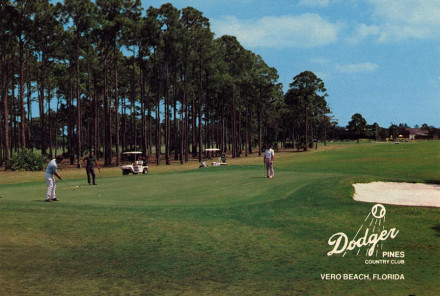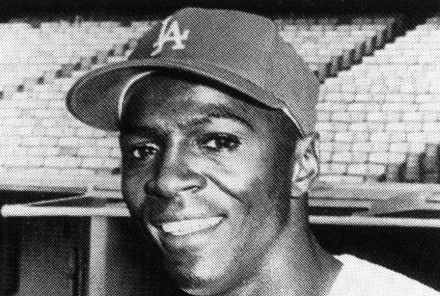Dodgertown Memories
“Sweet” Lou Johnson
- Outfielder
- 1965–67

The beauty of Dodger Pines Country Club and its 18-hole public golf course is evident in this postcard, circa 1970s.

“Sweet” Lou Johnson was the sparkplug that carried the Dodgers to their 1965 World Championship title. Recalled from Spokane in the Pacific Coast League in May, Johnson was an immediate contributor providing power to a team that lacked it as his 12 home runs tied him for the club lead. He scored the only run in Sandy Koufax’s 1965 perfect game. Johnson hit two home runs in the 1965 World Series for the Dodgers, including a solo home run in Game 7 to give Koufax all the runs he needed in his shutout for the Dodgers’ World Championship.
“Sweet” Lou Johnson will forever be remembered for two important historic events in Dodger history. The first is when he collected the only hit in the 1-0 perfect game thrown by Dodger ace Sandy Koufax against Chicago on September 9, 1965. While Koufax completely stifled the Cubs, Chicago’s Bob Hendley only surrendered one hit – a seventh-inning double to Johnson. The game’s only hit, however, did not figure in the scoring. But, it was also Johnson who scored the lone run in the fifth inning after he walked, was sacrificed to second, stole third and scored on catcher Chris Krug’s throwing error. Secondly, Johnson became the hero of Game 7 of the 1965 World Series against the Minnesota Twins, as the Dodgers and Koufax blanked the Twins in Minneapolis, 2-0, as Johnson belted a solo home run that hit the left field foul pole in the fourth inning to account for the winning run. It was Johnson’s second home run of that World Series. Walter O’Malley once called Johnson a “delightful character.” Johnson passed on October 1, 2020.
One of the things that I can recall is that for the first time I lasted for a Spring Training without being traded in 1964. There was a trade that was made with Detroit for Larry Sherry and that’s how I got to the Dodgers. I walked into Dodgertown and what amazed me was that most organizations didn’t have everybody there, the minor leagues and the major leagues; everybody didn’t have an opportunity to eat all together. The next thing was there was a history there. Every African-American person who played baseball would have loved to have had a chance to play there just to honor Jackie (Robinson). Don’t let anybody tell you that they wouldn’t. I got the opportunity. In doing that, I met some new people. When I lasted a whole season and got a chance to play the next season, that was a year that I thought maybe I would get a chance to fulfill a dream. I had a good winter. I lost the batting championship in Spokane and then went to Puerto Rico and won and I didn’t get an invitation. So, I was angry. But then, as I had a tendency when I’m angry, I became a better ballplayer. I was at an advanced age and you talk about Dodgertown, you’re talking about guys who are not split. We had a chance to talk with the major leaguers, sleep in the barracks with the major league players, so you get a chance to be around where you want to go. You were getting some history there. I had a great time. I had a great time with Buzzie (Bavasi). I had a great time seeing Peter (O’Malley) ride that bicycle all the time. He got his exercise. He’d go by me and wave. We had a day that we used for camp day where we had competitions – the dashes. We got a chance to compete in that capacity. Then we got a chance to be on camp. Florida was not an easy place for a black person at that time. There were some hostilities. It was the 1960s, with riots and all of that. There was a little small town (Gifford) that was adjacent to Vero Beach that we had to go to. So, I’ve been through those situations. But, then as I have been elevated to a higher level in baseball, I thought it would be a little different.
“What I found out, after I got to be a part of the Dodger organization in the capacity of the major leagues, was Peter and Mr. (Walter) O’Malley (I call him that out of respect), they made it possible for us to be as comfortable as we could be with the town as it is or was and play to a caliber that we were supposed to do. If I’d be honest, I was never looking forward to going back to Spring Training to start out a season with hostility. But, if you turn it around, and put it in a form of competitiveness, you work harder. You always had some of the older guys to talk to us. By that time, not too many were still around. There was Tommy (Davis), Willie (Davis), (Maury) Wills and Jim Gilliam and I got a chance to talk with those guys and knowing about them and got a chance to be with them. It made a big difference. If I look back on those days, I wouldn’t trade them. I’ll tell you one thing, there was not another Spring Training site like ours. I’ve talked to a lot of people. A lot of other organizations would be angry, because we were telling them how good it was over there because a lot of them stayed off base, some of them had to eat in restaurants outside of that. It was really comfortable after a while, it really was.
“If I look back at Spring Training, for me from 1964 until today, I love Vero Beach. It’s not over yet. It’s going to be a sad day when it’s the last day. Not just only for us, but the people who were there before us. We grew up there. We matured there in terms of being human beings in society because everything was available to us. We saw the first-class movies there (on base). We learned from the older players how to act. My hat’s always been off to the O’Malley family for doing the best that they could under the circumstances. The only thing they could do is what they did – to make it as comfortable as possible. They couldn’t rule the town. When they put that golf course up there, that was a highlight. I didn’t know one place we could go to play golf. That made a big difference, I think, in the African-American players in their appreciation of Walter O’Malley.
“I do think so, because there was a relaxation for Willie, Tommy and Jim Gilliam. They were all great golfers. Now we had a place to go that we could call our own, other than Spring Training. I didn’t play golf, but I had an opportunity to be around them afterwards, so we didn’t have to go sit in our rooms. Speaking for the African-American players, it was a comfort zone. I am glad that I was a part of that history and experience.
“I can say it now because Fresco (Thompson) is gone. We were all down in Gifford. He used to watch us coming in. The best throw I ever made in my life, I hit Fresco with a grapefruit. He was in the tree as a spy. POW! I haven’t made a throw in and off the field (like that) since then. I was very close. I had to be very close to be that accurate. I don’t think he ever knew (it was me). We as an organization and lower level players, we worked hard not to go over to the field over by the airport. The guys used to go over there in the morning and you didn’t see them again until dinner time. That was a long way. Then there was Buzzie. I look at him as a man who knew how to motivate off the field. When you look at General Managers, all of them had their little things, but Buzzie always kept money in his pocket. Willie Davis always knew where the big bills were. I’d stick my hand in his pocket and I’d come out with a five. He comes out with hundreds! That was an incentive. They had ways of motivating, they understood the circumstances. We used to play pool. We all did our little funny things right there on the base. When we went to Gifford we had to walk. It was about five to seven miles one way. We met a lot of people who were Dodger people. They honored the Dodgers with respect. Some of them were schoolteachers and so forth and we learned quite a bit. Now, it is a little different because of integration. We had a lady named Betty. Betty was the housekeeper. All of Betty’s daughters and granddaughters work down there now. Betty kept us straight. Betty made sure we got up early in the morning in the barracks. When I first went there as a major leaguer, my room and Jim Gilliam’s room were right under Mr. O’Malley. So, I had one of those jukebox things. I used to play my music and it got kind of loud. Jim was a quiet person; not me, I wasn’t quiet. I turned that thing up and Mr. O’Malley would stomp on the floor with ‘Turn that damn thing down Lou! Turn it down’ in his grumpy voice. (Laughs) We got a chance to be together and learn from each other. I think today it is a little different. You are off base, you don’t get to know each other. It’s kind of sad. You are constantly talking about money. We are going to move, I’m going to miss it. I want to thank the O’Malley family for giving me the opportunity to come back and be the man that I always wanted to be. Really, nobody else would have done what they did for me. I will be eternally grateful for the rest of my life.”
“Sweet” Lou Johnson

